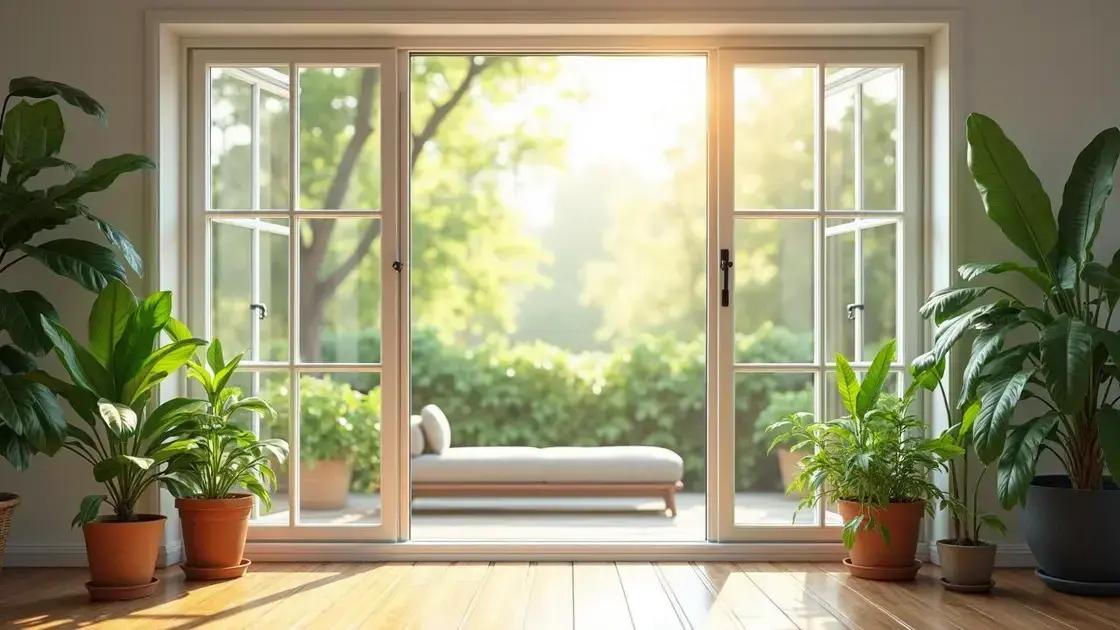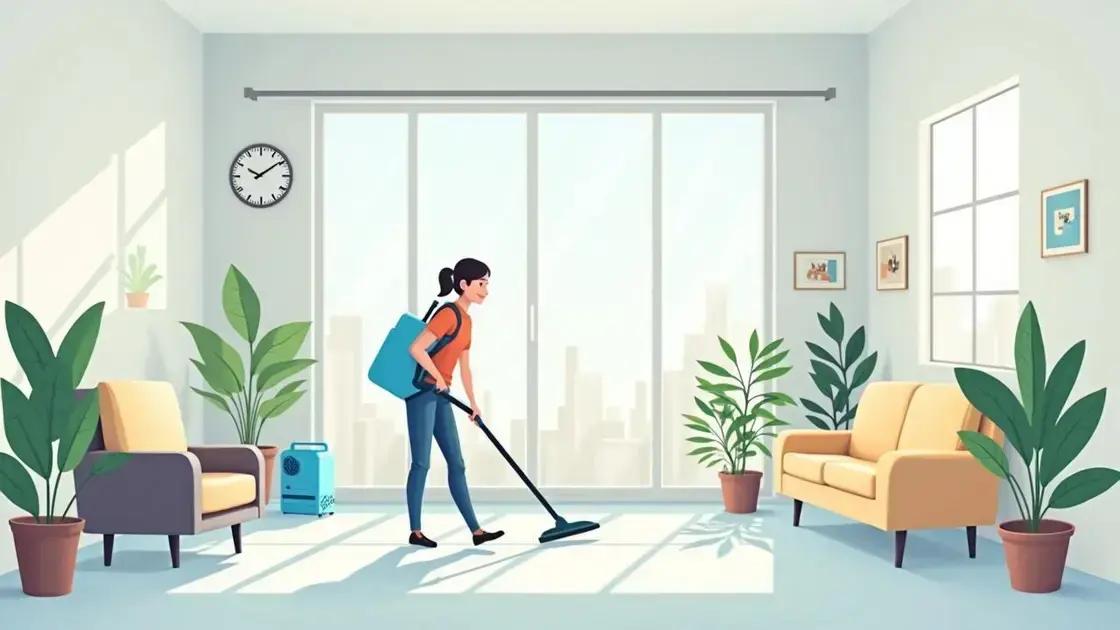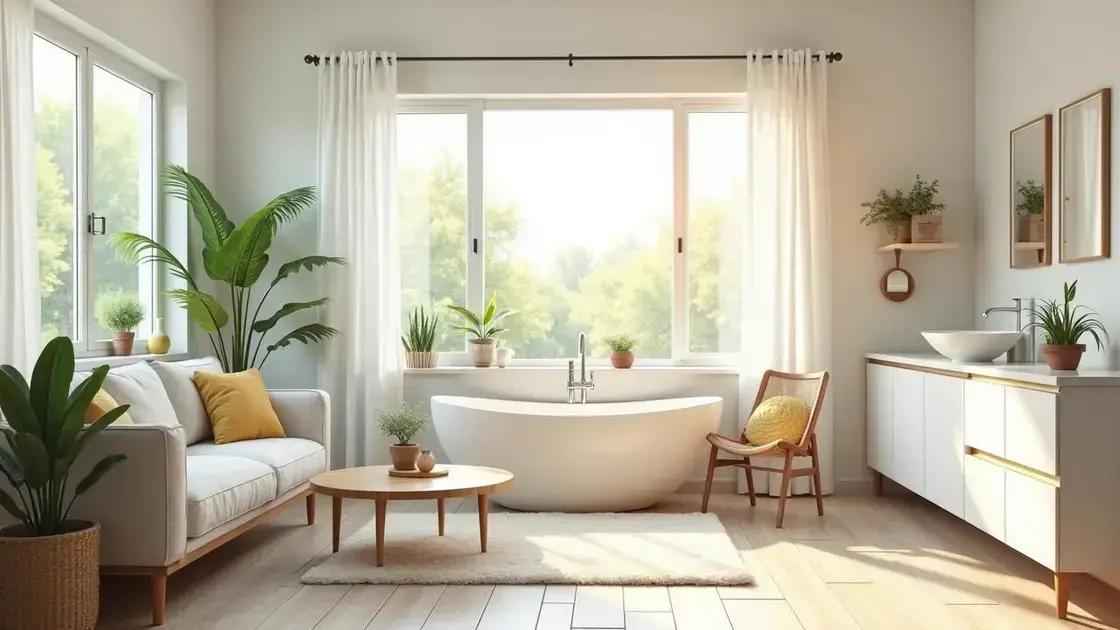The role of fresh air and ventilation in healthy living is crucial for maintaining indoor air quality, reducing pollutants, and enhancing overall well-being. Effective solutions include regular ventilation, using air purifiers, and ensuring cleanliness in your home.
Fresh air and ventilation play crucial roles in promoting a healthy living environment. Without adequate fresh air, indoor spaces can become filled with pollutants and allergens, leading to negative health effects. In this article, we will explore the importance of fresh air and ventilation, highlight its benefits, and provide practical tips for improving indoor air quality. Dive into the ways you can create a healthier home environment by understanding the essentials of air circulation and its impact on wellbeing.
Understanding Fresh Air and Its Benefits

Fresh air is an essential part of maintaining a healthy living environment. It refers to clean, natural air that is free from pollutants and allergens. This air can be found outdoors, and when it comes inside our homes, it plays a significant role in enhancing our well-being.
Benefits of Fresh Air
One major benefit of fresh air is improved mental clarity. Studies show that breathing clean air can help you think better and focus more effectively. Fresh air can also boost your mood and energy levels, making you feel more awake and alert.
Physical Health Advantages
Breathing in fresh air can greatly improve your respiratory health. By reducing indoor air pollutants, such as smoke and dust, you can lower your risk of allergies and respiratory diseases. This is especially important for people with conditions like asthma.
Enhancing Sleep Quality
Having fresh air circulating in your home can contribute to better sleep quality. Good airflow helps maintain a comfortable temperature during the night, making it easier for you to fall asleep and stay asleep.
Promoting Overall Well-Being
Overall, fresh air contributes to your physical and mental health by minimizing stress and promoting relaxation. It encourages you to spend more time outdoors, engaging in activities that boost your well-being. Making an effort to allow fresh air into your home can enhance your quality of life significantly.
Importance of Proper Ventilation

Proper ventilation is crucial in maintaining a healthy indoor environment. It allows fresh air to circulate throughout your home, which helps reduce the buildup of indoor pollutants. These pollutants can come from various sources, including cooking, cleaning products, and even furniture.
Reduces Indoor Pollutants
With effective ventilation, you can significantly lower harmful substances in your air. This reduction can lead to fewer respiratory problems and a lower risk of chronic health issues. Proper airflow effectively pushes out stale air, replacing it with fresh oxygen, which is vital for your health.
Humidity Control
Ventilation also plays a key role in managing humidity levels. High humidity can lead to mold and mildew, which thrive in damp environments. By ventilating your space, you can help maintain balanced humidity levels, creating a more comfortable living space and reducing potential health risks associated with mold exposure.
Enhancing Energy Efficiency
A well-ventilated home can also be more energy-efficient. When fresh air circulates properly, it reduces the need for heating and cooling systems to work overtime. This can lead to lower energy bills and a smaller carbon footprint, making your home not only healthier but also environmentally friendly.
Promoting Comfort
Proper ventilation enhances overall comfort in your living space. Stale air can make rooms feel stuffy and uninviting. With good airflow, you can enjoy a pleasant atmosphere, making your home a more enjoyable place to be.
Ways to Improve Indoor Air Quality

Improving indoor air quality is essential for a healthy living environment. Here are some effective ways you can enhance the air you breathe inside your home.
1. Ventilate Regularly
Open windows and doors to allow fresh air into your space. Proper ventilation helps keep indoor air fresh by reducing pollutants. Aim to ventilate your home regularly, especially when using products that can release harmful fumes, such as paints or cleaning supplies.
2. Use Air Purifiers
Invest in a high-quality air purifier equipped with HEPA filters. These purifiers can capture small particles and allergens, improving the air quality in your home. Place them in frequently used rooms to maximize their benefits.
3. Houseplants for Natural Filtration
Certain houseplants can naturally filter and purify the air. Plants such as spider plants, peace lilies, and snake plants help remove toxins from the air. Adding greenery not only beautifies your home but also enhances air quality.
4. Maintain Cleanliness
Regular cleaning helps control dust, pet dander, and other allergens. Use a vacuum cleaner with a HEPA filter and dust surfaces frequently. Don’t forget to wash curtains and bedding to reduce the buildup of indoor pollutants.
5. Monitor Humidity Levels
Humidity affects air quality significantly. Keep indoor humidity levels between 30% and 50%. Use dehumidifiers if humidity is too high, as this can help prevent mold growth. Conversely, humidifiers can be useful in dry months to maintain balance.
Fresh Air Solutions for Healthy Homes

Bringing fresh air into your home is essential for health and wellness. Here are some effective solutions that can help improve the air quality in your living spaces.
1. Install Exhaust Fans
Exhaust fans are great for removing stale air from your kitchen and bathrooms. By installing them, you can help eliminate moisture and odors, enhancing the overall air quality in your home.
2. Use a Balanced HVAC System
Having a well-maintained heating, ventilation, and air conditioning (HVAC) system can greatly benefit your home’s air quality. Regularly change or clean filters to ensure optimal performance and efficiency.
3. Implement Natural Ventilation
Consider opening windows and using cross-ventilation to capitalize on natural breezes. This type of airflow helps dilute indoor pollutants and keeps your home feeling fresh and cool.
4. Choose Non-Toxic Products
When shopping for home products, opt for non-toxic and low-VOC (volatile organic compounds) items. These include paints, cleaners, and furnishings that do not release harmful chemicals into your living space.
5. Regular Maintenance and Inspection
Regularly inspecting your home for mold and moisture problems can prevent air quality issues. Make sure to address leaks and spills quickly to prevent heavy growth and contamination in your home.
Emphasizing the Importance of Fresh Air and Ventilation
Incorporating fresh air and proper ventilation into your daily life is essential for maintaining a healthy living environment. Good air quality improves mental clarity, supports respiratory health, and enhances overall well-being.
By implementing the strategies discussed, such as regular ventilation, using air purifiers, and maintaining your HVAC system, you can significantly improve indoor air quality.
Moreover, selecting non-toxic products and ensuring cleanliness will further enrich your home environment. Remember, fresh air solutions are not just about comfort; they play a vital role in nurturing your health and happiness.
Take action today to create a healthier home, as it contributes to a better quality of life for you and your loved ones.
FAQ – Frequently Asked Questions about Fresh Air and Ventilation for Healthy Living
Why is fresh air important for my home?
Fresh air is crucial for maintaining good indoor air quality. It helps reduce pollutants and allergens, promoting better health and well-being.
How can I improve indoor air quality?
You can improve indoor air quality by ventilating regularly, using air purifiers, keeping your home clean, and using non-toxic products.
What role does ventilation play in my home?
Proper ventilation helps circulate fresh air, reduce humidity, and eliminate stale air, which is vital for respiratory health.
What are some effective solutions for fresh air in my home?
Effective solutions include installing exhaust fans, maintaining your HVAC system, and utilizing houseplants for natural air filtration.
How often should I ventilate my home?
It’s best to ventilate your home daily, especially during activities that produce pollutants, like cooking or cleaning.
Can air purifiers really help?
Yes, high-quality air purifiers with HEPA filters can significantly reduce allergens and pollutants in your indoor air.













